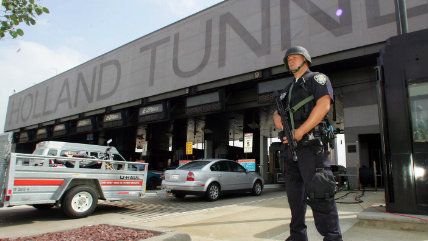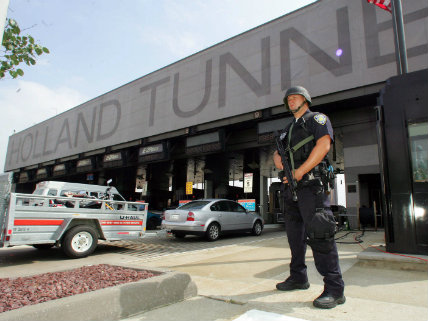New Jersey Police Seize $171 From Man, Charge Him $175 to Challenge It
Hudson County, New Jersey combine dozens of asset forfeiture cases for amounts as low as $11, forcing defendants to pay higher filing fees to challenge them.


After the Hudson County Prosecutor's Office sued New Jersey resident Jermaine Mitchell to keep $171 dollars seized from him during a drug arrest earlier this year, it sent him a notice in jail of his right to challenge the seizure. The catch? It would cost him $175 just to file the challenge.
Mitchell's is one of 21 civil asset forfeiture cases that the Hudson County Prosecutor's Office combined together in a what the ACLU of New Jersey said in a court filing last week is an unlawful scheme that deprived Mitchell and the other defendants of their due process rights under the Constitution.
"The Hudson County Prosecutor's Office has made it difficult, and in many cases virtually impossible, for people to challenge the seizure of their property," ACLU-NJ Staff Attorney Rebecca Livengood, who represents Mitchell, said in a statement. "The Prosecutor's Office has abdicated its duty to respect the rights of New Jerseyans — especially those with the fewest resources to begin with—in a blatant affront to due process."
Under civil asset forfeiture, which flourished across the country as a key tool in fighting the drug war, police can seize property—cash, cars, guns, and even homes—if they have probable cause that the property is connected to a crime. However, the property owner does not need to be convicted of a crime, or even charged, for the seizure to be upheld.
Law enforcement official often say asset forfeiture laws allow them to target drug traffickers and lucrative criminal operations by cutting off their proceeds, but civil liberties groups argue the perverse incentives of asset forfeiture lead police to shake down everyday citizens for petty amounts of cash. And, civil liberties groups argue, the process of trying to challenge a seizure is heavily weighted in favor of the state.
By rolling the 21 cases into one—a practice allowed under New Jersey law when the cases involve the same "transaction or occurrence"—the total amount of assets involved passed the $15,000 threshold to bump the case up to the Law Division of the state superior court, rather than the division that handles smaller matters, where the filing fee to challenge a seizure is only $15.
But the ACLU of New Jersey argues that most of the 21 cases are in no way connected. They were filed in different towns over the course of several months, and only five involved conspiracy charges. Six of the cases involved amounts of money below $175.
"By circumventing that system through improper joinder, the State is able to seize amounts less than $175 with total impunity from having to make its case on the merits," the ACLU of New Jersey wrote in the court filing.
According to public records obtained by the ACLU, Hudson County has the highest number of civil asset forfeitures in New Jersey, and it often packages together cases. "One action in February 2016 combined forfeiture cases against 63 people," the ACLU of New Jersey wrote. "One 2015 seizure included in a case combined with 28 others, police took $11 from a person."
Hudson County's practice of joining cases is unusual in the state, and of the nearly 500 individual forfeiture cases bundled together so far this year, half of them were for amounts of less than $175, the ACLU told NJ.com. If the property owners don't challenge the seizure, their money is forfeited to the state by default.
The Institute for Justice, a libertarian-leaning public interest law firm, gave New Jersey a "D-" grade for its asset forfeiture laws in a report released last year. According to the Institute for Justice, New Jersey's asset forfeiture program raked in more than $72 million in proceeds from 2009 through 2013, although it said that is likely a vast undercount because of the state's lack of transparency surrounding the program.
The Hudson County Prosecutor's office declined to comment, but in a statement to New Jersey media, Hudson County Prosecutor Esther Suarez said her office is "acting properly."
"Proceeds from any criminal activity are often utilized by defendants to purchase goods which are used to facilitate future crimes," TK told NJ.com. "The HCPO will continue to take all lawful action to ensure that crime in our county does not pay and that any proceeds of a crime are removed from the hands of the criminals and used for a lawful public purpose."
